Supreme Court Upholds PMLA Proceedings Against JSW Steel in Money Laundering Case
In a significant ruling that clarifies the scope of money laundering investigations, the Supreme Court has declined to quash proceedings against JSW Steel Limited in a case involving alleged money laundering through iron ore transactions. The court’s decision emphasizes the importance of allowing statutory processes to run their course and establishes important principles regarding the Prevention of Money Laundering Act (PMLA) proceedings.
The case originated from a complex web of transactions involving JSW Steel and Obulapuram Mining Company Private Limited (OMC), with allegations of illegal mining and money laundering spanning over a decade. The Enforcement Directorate had initiated proceedings against JSW Steel, claiming that the company was involved in transactions that constituted proceeds of crime under the PMLA.
The Complex Background
The legal dispute has its roots in an agreement dated November 16, 2009, where JSW Steel entered into a contract with OMC for the supply of 1.5 Million Metric Tons of iron ore, fines, and lumps to its plant at Vijayanagar. Between November 2009 and December 2009, partial supplies were made by OMC from its mines, and subsequently until March 2010 from its group companies, including Ananthpur Mining Corporation and Associate Mining Company (AMC).
The matter took a serious turn when the Supreme Court, on September 23, 2011, directed an investigation into illegal mining and export of iron ore by AMC, a partnership firm of G. Janardhan Reddy. The Central Bureau of Investigation registered a case and initially named JSW as an accused, but later dropped charges against the company in a supplementary final report filed on September 6, 2013.
Meanwhile, the Enforcement Directorate registered ECIR/09/BZ/2012 under the PMLA against G. Janardhan Reddy and G. Lakshmi Aruna on September 25, 2012. This marked the beginning of a separate money laundering investigation that would eventually involve JSW Steel.
Arguments by JSW Steel
The learned Senior Advocate for JSW Steel presented several compelling arguments seeking quashing of the proceedings. He emphasized that “the entire prosecution is founded on mere apprehension. He emphasised that JSW was although charge-sheeted initially but subsequently the charges have been dropped by CBI and is not named in ECIR. In the absence of a live scheduled offence, there can be no proceeds of crime and consequently no offence under Section 3 PMLA.”
He relied on the decision in Vijay Madanlal Choudhary and Others v. Union of India and Others to contend that “quashing or discharge in predicate offence nullifies PMLA proceedings.”
Regarding the financial transactions, he argued that “the withdrawals to the tune of INR 21.45 Crore were made prior to the communication of PAO 08 of 2015 and thus could not have constituted as wilful frustration of the said order. The withdrawals which were made during the period of the stay granted by the High Court was lawful. The ED in its complaint admits that account balances increased subsequently, demonstrating the absence of mens rea to project the property as untainted.”
He further contended that “cash-credit accounts cannot be subjected to attachment as they represent drawing limits and not specific property. He further argued that ED has misunderstood the nature of a cash credit account. Such accounts is in the nature of an overdraft facility where the account holder is entitled to withdraw funds.”
The senior advocate also invoked established legal principles, relying on “the decisions of this court in R.P. Kapur v. State of Punjab and State of Haryana and Others v. Bhajan Lal and Others, to argue that prosecution should be quashed when allegations, taken at face value, do not constitute an offence.”
Enforcement Directorate’s Counterarguments
The learned Senior Advocate appearing for the ED vehemently opposed the appeals and submitted that “the present case discloses a clear and continuing offence under Section 3 of the PMLA. Submission has been made that in pursuance of this Court’s Order dated 23.09.2011 passed in Gout. of A.P. & Ors. v. M/s Obulapuram Minig. Co. P. Ltd. & Ors. Etc., CBI registered FIR RC 18(A)/2011/CBI/ACB/BLR on 01.10.2011 for serious offences under IPC, PC Act, MMDR Act, and Forest Act against the partners of AMC.”
The ED argued that after investigation, they found that “INR 33,80,87,617/- (Thirty-Three Crore Eighty Lakh Eighty-Seven Thousand Six Hundred Seventeen Rupees) remained payable by JSW to AMC which constituted ‘proceeds of crime’ under Section 2(1)(u) of PMLA.” To secure this amount, provisional attachment orders were issued.
The ED strongly contended that “despite a clear statutory bar, JSW, in collusion with bank officials, frustrated the attachment by withdrawing funds immediately after the issuance of PAO 08 of 2015 on 27.03.2015.” They placed reliance on contemporaneous emails and letters from Vijaya Bank/Bank of Baroda to submit that “the lien on account no. 139500301000053 was wrongfully lifted despite written directions from the ED not to do so. The withdrawals left only INR 7.81 Crore available out of the attached sum, causing a shortfall of INR 16.55 Crore, which continues to be in the possession of JSW.”
The ED further stated that “possession of confirmed attached property by the accused, in defiance of lawful attachment, squarely falls within Section 8(4) of PMLA and constitutes ‘concealment, possession, acquisition and use’ of proceeds of crime punishable under Section 3 of PMLA.”
Regarding the nature of bank accounts, the learned ASG submitted that “bank accounts are considered ‘property’ within the meaning of Section 2(1)(v) of the PMLA, as established by this Court in State of Maharashtra v. Tapas D. Neogy. He further argued that the attachment of a specified quantum from these accounts is therefore valid.”
Supreme Court’s Reasoning and Decision
The Supreme Court, after hearing both parties and perusing the records, made several crucial observations. The court noted that “the Appellants have already invoked their statutory remedy before the Appellate Tribunal under Section 26 of the PMLA, which remains pending.”
The court emphasized the comprehensive nature of PMLA’s adjudicatory mechanism, observing that “the PMLA provides a comprehensive and self-contained adjudicatory mechanism. Section 5 enables Provisional Attachment, Section 8 contemplates confirmation by the Adjudicating Authority, and Section 26 provides an appellate remedy before the Appellate Tribunal. The appellants, in the present case, have already invoked their statutory remedy of Appeal, which remains pending.”
The court invoked the principle of alternative remedy, stating that “This Court has consistently held that constitutional or appellate jurisdiction should ordinarily not be exercised where an efficacious alternate remedy is available and is actively being pursued. Reference may be made to Union of India and Another v. Guwahati Carbon Limited, which cautions against bypassing statutory forums except in cases of patent illegality or jurisdictional error.”
The court made an important factual clarification, noting that “it is undisputed that the ECIR registered by the ED does not name the appellants as accused persons. The charge-sheet filed by the CBI under RC 18(A)/2011/CBI/ACB/BLR also does not array them as accused, having dropped them in the supplementary report after finding no material to proceed. The complaint filed by the ED is predicated not on any independent act of laundering but on the allegation that the appellants withdrew certain sums from the attached bank accounts in violation of the PAOs.”
The court framed the core issue as “whether the specific sum of INR 33,80,87,617/- (Thirty-Three Crore Eighty Lakh Eighty-Seven Thousand Six Hundred Seventeen Rupees), representing unpaid consideration for iron ore supplied by AMC, can be treated as ‘proceeds of crime’ and whether its withdrawal post-PAO constitutes an offence under Section 3 PMLA.”
The court cautioned against overbroad interpretations, noting that “the apprehension that the entire account balance constitutes proceeds of crime is misplaced, particularly when the admitted position is that payments were made and received through regular banking channels and are duly reflected in the books of account.”
The court ultimately concluded that “the appropriate course would be to permit the statutory process to run its route to reach its logical conclusion. Interference at this stage would prejudge issues that are squarely within the domain of the Appellate Tribunal, including whether the attached property represents ‘proceeds of crime’ within the meaning of Section 2(1)(u) PMLA and whether the withdrawals were in violation of law.”
The court specifically held that “In light of these findings, we are unable to hold that the case for quashing the cognizance order or interdicting proceedings is made out. The allegations, at this stage, are confined to the recovery of the quantified amount of INR 33.80 Crore and do not extend to fastening criminal liability upon the appellants beyond that process. The apprehension of arbitrary prosecution is, therefore, misplaced.”
Impact and Implications
The Supreme Court’s decision has significant implications for money laundering cases in India. By refusing to quash the proceedings at this stage, the court has reinforced the principle that statutory processes should be allowed to complete their course, especially when alternative remedies are available and being pursued.
The judgment clarifies that the mere fact that a company was initially named and then dropped from a predicate offense does not automatically immunize it from PMLA proceedings if there are independent allegations of money laundering activities.
Furthermore, the court’s observation that the case is primarily about recovery of a specific quantified amount rather than broad criminal liability provides important guidance for similar cases where the allegations are confined to specific financial transactions rather than widespread criminal conspiracy.
The decision also underscores the importance of the PMLA’s comprehensive statutory framework and the need to exhaust available remedies within that framework before approaching constitutional courts for intervention.
As the matter now returns to the Appellate Tribunal under PMLA, this judgment sets the stage for a focused examination of whether the specific transactions in question qualify as ‘proceeds of crime’ and whether the company’s actions in dealing with attached funds constituted offenses under the money laundering law.
Petitioner Name: JSW Steel Limited etc..Respondent Name: Deputy Director, Directorate of Enforcement etc..Judgment By: Justice Dipankar Datta, Justice Augustine George Masih.Place Of Incident: Multiple Locations including Vijayanagar.Judgment Date: 07-10-2025.Result: dismissed.
Don’t miss out on the full details! Download the complete judgment in PDF format below and gain valuable insights instantly!
Download Judgment: jsw-steel-limited-et-vs-deputy-director,-dir-supreme-court-of-india-judgment-dated-07-10-2025.pdf
Directly Download Judgment: Directly download this Judgment
See all petitions in Money Laundering Cases
See all petitions in Fraud and Forgery
See all petitions in Corporate Compliance
See all petitions in Judgment by Dipankar Datta
See all petitions in Judgment by Augustine George Masih
See all petitions in dismissed
See all petitions in supreme court of India judgments October 2025
See all petitions in 2025 judgments
See all posts in Criminal Cases Category
See all allowed petitions in Criminal Cases Category
See all Dismissed petitions in Criminal Cases Category
See all partially allowed petitions in Criminal Cases Category







